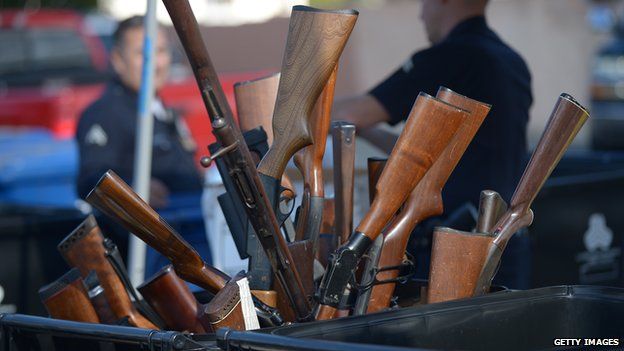US gun debate: Could Obama's guns plan work?
- Published

President Barack Obama's plan to reduce gun violence focuses on gun sales, mental health, school safety and public health research. But will it work?
No single policy can end gun deaths and prevent massacres like that at Sandy Hook Elementary School, where last month a gunman killed 26 people, including 20 children.
Mr Obama admitted as much when he announced a plan to change America's gun culture on Wednesday.
"Reducing gun violence is a complicated challenge," he said. "If there's even one thing we can do to reduce this violence, if there's even one life that can be saved, we have an obligation to try."
Most public health officials agree on the need for a patchwork approach to the problem - one encompassing gun regulations, mental health initiatives and a hard look at violence in popular culture.
"Gun violence is not just an issue of ownership and criminality and not just an issue of mental health," says Dariush Mozaffarian, co-director of the programme in cardiovascular epidemiology at Brigham and Women's Hospital and Harvard Medical School.
"If we look at it broadly as a public health issue, we will be much more successful than just trying to address one or two specific pathways."
Driving accidents and smoking deaths are two such issues that benefitted from a broad approach, he says.
But can Mr Obama's proposals be effective? We take a closer look at some of the provisions in the plan.
Criminal background checks
"The most important thing we need to do is fix our current system of background checks," Daniel Webster, director of the Johns Hopkins Center for Gun Policy and Research, said this week at a press conference.
"It is indefensible that we have a system that allows people to sell guns with no background checks."
According to the US justice department, up to 40% of gun purchases take place without a background check - those from private sellers and some at gun shows.
Closing the loophole will weed out those with criminal or psychiatric backgrounds legally barring them from gun ownership, Mr Webster said.
But background checks would not have stopped most school shootings, in which the gunmen took legally obtained weapons from parents with spotless backgrounds, says Jack Levin, a professor of sociology and criminology at Northeastern University in Boston.
Many gunmen have a clean criminal history - they are just having a really bad day, he says.
He says most gun deaths are classified as manslaughter, which implies a crime committed without forethought.
"In those cases, the criminal may not have a psychiatric record or a criminal history," says Mr Levin.
"His pathology is situational. He loses his cool, loses his temper, and in the heat of the moment he takes out his knife from the kitchen drawer or gun from his trench coat and shoots."
Banning assault weapons and large ammunition magazines
The proposed assault weapons ban would eliminate the sale of weapons designed, as Mr Obama said, "to pump out as many bullets as fast as possible".
Mr Webster said these weapons are particularly dangerous - and their ban could reduce deaths.
"We believe they pose a unique threat with respect to mass shootings," he said. "The casualty numbers tend to be larger with such weapons."
Limiting magazine size - and thus the number of bullets that can be shot without reloading - could help reduce fatalities, Mr Webster said.
Mr Obama noted the gunman at a cinema in Colorado in July shot 70 people in minutes.
When gunmen need to reload, victims and first responders have a chance to fight back, says Mr Levin.
But Mr Levin also points out that most gun deaths are the result of handguns.
"One bullet, one body," he says.
Mental health initiatives
Mr Levin says addressing mental health provides the biggest way to prevent shootings - but it is important that the motivation is right.
"We wait until someone looks troublesome, but we should get in touch with them and intervene when they're troubled," he says. "Not to prevent a murder, but to help them."
Mr Obama called for mental-health counsellors, as well as anti-bullying resources for 8,000 schools.
More research into media effects on gun violence
National Rifle Association Executive Vice-President Wayne LaPierre last month called violent video games and television programmes part of the problem.
That line was widely ridiculed by gun control advocates as an oversimplification, but Mr Obama has since said he wants to study the impact of violence in pop culture.
That's progress, says Mr Mozaffarian.
"Even during the day if I'm watching a sporting program... almost every commercial break there's a commercial with people being shot, guns being pulled out," he says.
He says ubiquitous images of violence create "a strong unconscious acceptability".
"We have common-sense regulations to minimise obscenity and nudity, and almost nothing for gun violence," he says.
While he says larger cultural change is possible - and necessary - he admits that it can take a long time.
The question is how long the nation can wait.